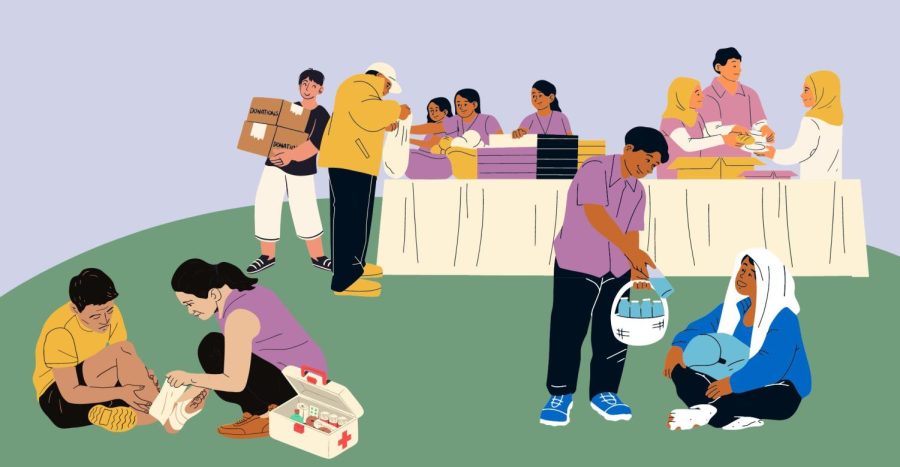Prepare for Disaster
Families and volunteers are seen handing supplies and giving first aid to the injured. In January, there was a hygiene drive where UHS students could donate new and unused hygiene supplies to the residents living in transitional housing.
March 14, 2023
*The opinions expressed within the content are solely the author’s and do not reflect the website’s or its affiliates’ opinions and beliefs.*
Whether it’s buildings crumbling down, viruses spreading wild, or tides sweeping away homes, disaster strikes unexpectedly, leaving people distraught and terrified of their future. Any form of crisis can wreak havoc on individuals, families and entire communities. In today’s world, where the threat of catastrophe looms, countries must prioritize disaster preparedness and take steps to ensure that they are equipped to handle such situations.
When disaster strikes, it is often the most vulnerable who suffer the most, including people who are homeless, financially unstable or the elderly. Poor infrastructure, inadequate healthcare facilities and lack of access to essential resources exacerbate the impact of disasters on individuals and communities. In addition, the absence of a comprehensive disaster management plan can lead to chaos and confusion, making it difficult for first responders to reach those in need.
The recent Kahramanmaras earthquake on Feb. 6, in Turkey and Syria, brought long-delayed attention to the natural disaster response. The sudden catastrophe struck havoc on people and left communities at a loss of what to do. 46,957 people died due to the impact of the earthquake, and countless others were left injured and homeless. As the world lives on in the aftermath of Kahramanmaras, those living in seismically active regions must be prepared for earthquakes. Residents need to know what to do before, during and after an earthquake, which can happen with the government’s aid. This includes having an emergency plan in place, having emergency supplies on hand, securing first responder plans and knowing the safe places to take cover during a disaster.
The World Health Organization reports that 15 hospitals in Turkey have been reported destroyed, and there are at least 60,000 recorded injuries. Furthermore, at least 57 additional hospitals and primary healthcare facilities in northwest Syria reportedly suffered partial damage or had to halt operations as a result of the earthquake. With hospitals not being able to help, people were left to take care of themselves, though they had no resources available. The lack of hospital availability delayed the treatment time, causing more death and severe injuries to people.
Governments and communities need to take steps to prepare for earthquakes, such as implementing building codes and regulations, conducting regular earthquake drills and having emergency response plans in place to help mitigate the impact of an earthquake.
The world has seen its fair share of disasters in recent years. From the 2010 earthquake in Haiti to the ongoing COVID-19 pandemic, disasters have shown that no country is immune. However, some countries are better prepared than others. For instance, Japan is one of the most earthquake-prone countries in the world, but it has invested heavily in disaster preparedness. As a result, when a major earthquake hit Japan in 2011, the country was able to respond quickly and effectively, minimizing the impact of the disaster.
For example, every cell phone sold in Japan has an earthquake alarm feature that may give customers up to a 10-second warning to find shelter before the quake occurs. Buildings and homes that are earthquake resistant are made to sway with the earthquake rather than collapse and harm occupants. The government has also published detailed instructions, one of which is to put together an emergency bag before a calamity. Natural catastrophe drill participation starts in kindergarten, and training sessions and displays are frequent. Public access to nearby emergency facilities and evacuation centers is provided.
The COVID-19 pandemic is another prime example of how countries were unprepared to handle a large-scale crisis. The lack of personal protective equipment, ventilators and testing kits early on and the absence of a cohesive plan for responding to the pandemic led to an unmitigated disaster. Countries that had invested in disaster preparedness fared better, with a lower death toll and a more effective response.
The Global Health Security Index analyzed preparation levels by focusing on whether countries have the proper tools in place to deal with large-scale outbreaks of disease, with scores measured on a scale of 0 to 100 where 100 is the highest level of preparedness. The United States has the strongest measures in place and it came first with a score of 83.5, ahead of the United Kingdom with 77.9 and the Netherlands with 75.6. Hospitals and healthcare systems can be equipped with the necessary resources to respond to pandemics like COVID-19.
Similarly, disaster preparedness also involves a range of measures, including early warning systems, evacuation plans and emergency response teams. It also involves investing in infrastructure that can withstand disasters. For instance, building codes can be updated to ensure that they are better able to withstand earthquakes, hurricanes and other natural disasters.
According to The Federal Emergency Management Agency (FEMA), through a strong enterprise of institutions and partnerships managed by the National Training and Education Division (NTED) and the National Fire Academy of the United States Fire Administration (USFA), FEMA offers training and education for the country’s first responders, emergency managers and other members of the entire community.
Investing in disaster preparedness may seem expensive, but the costs of being unprepared can be much higher. The cost of rebuilding damaged infrastructure, providing aid to affected communities and compensating for lost productivity can run into billions of dollars. Earthquakes can inflict severe damage on infrastructure leading to fatalities, with some earthquakes causing more damage than others. The economic impacts of earthquakes range between $100 million and $100 billion. While it costs a fraction of the price, estimated around 3,000 to 7,000 dollars to prepare a home for a disaster.
In addition, disasters can leave emotional scars from the loss of loved ones, displacement and trauma, all of which can take years to heal from. By investing in disaster preparedness, countries can minimize the impact of disasters, saving lives and money in the long run.
Moreover, disaster preparedness is more than just the direct response to emergencies. It is also about building resilience and adaptability to prevent disasters from occurring in the first place. For instance, investing in renewable energy and reducing greenhouse gas emissions can help to mitigate the impact of climate change, which is increasingly leading to extreme weather events. Similarly, investing in healthcare infrastructure can help to prevent the spread of diseases and pandemics.
Countries must invest in disaster preparedness and ensure that they have a robust disaster management plan in place. This plan should be regularly updated and tested to ensure that it effectively responds to emergencies.
Furthermore, countries should work collaboratively with each other and share best practices and resources to improve their disaster preparedness. Disasters, whether natural or man-made, do not respect national borders and countries must work together to respond effectively to crises.
Moreover, disaster preparedness should be a top priority for every nation. Countries must invest in healthcare and disaster management plans to better prepare for future disasters. By investing in disaster preparedness, governments can better cope with emergencies, minimize the impact of disasters and save lives and money in the long run. The recent COVID-19 pandemic has shown that even developed countries can be caught off-guard by disasters, so it is critical that countries prioritize preparedness and can make a significant difference in the outcome of a crisis. The cost of not being prepared is simply too high, and the benefits of investing in disaster preparedness are clear. With cooperation, collaboration and effective planning, nations can create a better-equipped world to handle any disaster that comes their way.






